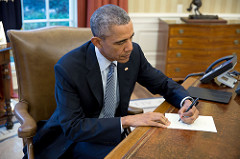
It’s official. President Barack Obama signed the Older Americans Reauthorization Act of 2016 on April 19 after it had passed both chambers of Congress with unanimous support earlier this year.
The act provides funding for services to almost 11 million seniors, including information and referral assistance, in-home supports, nutrition programs, transportation, caregiver support, job training, legal services and protection from abuse and financial exploitation, according to the National Association of Area Agencies on Aging.
The Eldercare Workforce Alliance, a group of 31 national organizations including LeadingAge, the Paraprofessional Healthcare Institute and AMDA – The Society for Post-Acute and Long-Term Care Medicine, said the reauthorization also will support the more than 40 million family caregivers who provide an estimated 37 billion hours of uncompensated care each year.
As of press time, the president had not issued a statement regarding the signing, but in remarks at last year’s White House Conference on Aging, he said he would work with Congress on reauthorization of the act. “We know it will provide critical support to families and communities,” Obama said at the time.
U.S. Department of Health and Human Services Assistant Secretary for Aging Kathy Greenlee issued a statement, saying: “I am delighted to see its reauthorization, and I am deeply grateful for the renewed commitment to preserving the rights of all people, for the full course of our lives.”
Sen. Lamar Alexander (R-TN), the bill’s sponsor in the Senate and chairman of the Health, Education, Labor and Pensions Committee, said, “For the last 50 years, the Older Americans Act has provided grants to states so they can help seniors live more comfortably at home or ensure high-quality care at a nursing home, and I’m glad to see that this important reauthorization has been signed into law.”
The 2016 reauthorization promotes chronic disease self-management and falls prevention, includes stronger elder justice and legal services provisions and offers new support for modernizing multipurpose senior centers, according to the National Council on Aging.
“Congress has reiterated its historic bipartisan support of the OAA and the aging services network that assists and empowers our nation’s seniors,” Howard Bedlin, NCOA vice president for policy and advocacy, said in a statement after the signing. “Now, we need the same bipartisan support of long overdue investments to ensure that this important legislation can meet the needs of our rapidly growing and diverse older adult population.”
2015 marked the 50th year since the original passage of the OAA.



